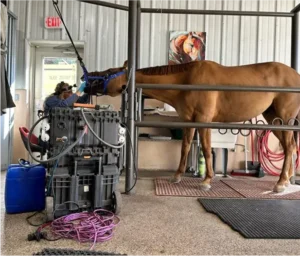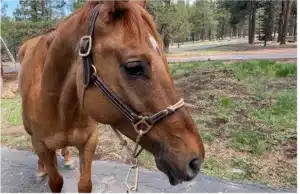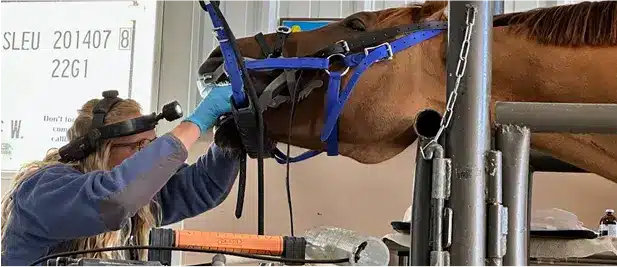Pencil is just about the most handsome and loveable gelding around. Very easy going and the softest eyes. When he was a colt, he was castrated and checked for wolf teeth. It was found through oral exam that he did not have any wolf teeth to extract.

Pencil had been trained and used for trail riding and spent one summer on a ranch. Being that he was your typical athletic Appendix horse, his second owner took him to High School rodeos which ended up being a short-lived relationship, and he was returned after two months. Following that, he went to a professional eventing trainer for a few months, who started him in dressage. He was a quick learner and was referred to as “the Unicorn”—his only issue at the time was being somewhat difficult while bridling. At age six, Pencil found his next home with a student of the trainer, where he started in light jumping and continued trail riding. Things seemed to be going well for the first six months, except for bridling and ear sensitivity issues. Still, over time his new owner noticed that he was becoming more difficult to ride and displaying some really dangerous behaviors, particularly at the start of rides. Pencil’s owner knew that something was wrong with her normally sweet-natured gelding and started with an oral exam. Pencil had not had any dental care that she was aware of in the past year but had been checked and floated by an equine dentist earlier in his life.
A surprise was found as soon as Pencil’s mouth was opened! At first glance, he did not appear to have wolf teeth but a quick feel of his mouth told a different story. Pencil had a secret sitting under the pink gums of his mouth. Two little raised bumps in the area where the bit typically sits were felt. A few quick x-rays and two “blind” wolf teeth were found.
The first premolar, otherwise referred to as a wolf tooth, is a vestigial tooth not typically associated with chewing. The first premolar is not present in all horses and sits in an area that can interfere with a bit. Occasionally, a wolf tooth will develop in a more tipped or horizontal plane, as opposed to the normal vertical orientation within the jaw, resulting in a blind or nonerupted wolf tooth. It is estimated that blind teeth only occur in 2-3% of horses that have wolf teeth. For horses with biting problems associated with blind wolf teeth, extraction of the teeth alleviate the clinical signs.

Pencil was floated and his blind wolf teeth were extracted. His owner noticed an immediate change in his demeanor and his ear sensitivity went away. Pencil seemed much more comfortable and was now back to being his happy self, even when being ridden.

